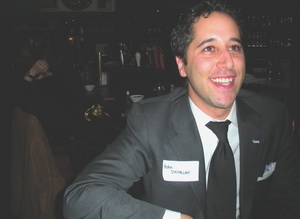A steady stream of beer, wine and fried snacks were being served to patrons crammed into the John Sleeman Pub on Peel St. as they watched U.S. election events unfold last week on big-screen TVs, cheering and jeering with every development. The atmosphere had all the markings of a major sporting event, but the crowd wasn’t watching the Canadiens losing to the Blue Jackets. They were watching the Democrats lose the House of Representatives to the Republicans and almost lose the Senate as well.
For political junkies – even those in Montreal with no vote and no direct stake in the race – the American mid-term elections are virtually as exciting as the Super Bowl or Game Seven of the Stanley Cup finals.
“We have a keen interest in American politics and what goes on in Washington,” said organizer Adam Daifallah, who works as a political strategist. “A lot of our friends are political junkies, so we just wanted to get everyone together from all parties to watch the results.”
“PQ, PLQ, Tories, PLC, NDP…we have people from all types of political parties and they’re all very interested in American politics,” said Daifallah’s colleague, Marie-Claude Johnson. “We planned a small party at first and invited a few people, and then it grew!”
Among those in attendance, city councillor Marvin Rotrand, The Gazette’s L. Ian Macdonald and former Green Party deputy leader Claude William Genest. As diverse as the crowd was politically, most seemed to sense that President Barack Obama had alienated himself from the American electorate.
 Obama’s election was “a big change for America and when the pendulum swings that far in one direction, it’s going to have a counter-reaction back the other way,” said Daifallah.“It’s an interesting political phenomenon. Americans aren’t seeing any tangible benefits for them so they’re frustrated, and that’s what gave rise to the Tea Party.”
Obama’s election was “a big change for America and when the pendulum swings that far in one direction, it’s going to have a counter-reaction back the other way,” said Daifallah.“It’s an interesting political phenomenon. Americans aren’t seeing any tangible benefits for them so they’re frustrated, and that’s what gave rise to the Tea Party.”
The interest in American politics goes far beyond the sport and entertainment aspect of these elections; for many Canadians, the election of certain candidates over others could have huge financial repercussions depending on the individual politician’s stance on trade and international commerce.
“We have a close economic relationship with the US,” Johnson said. “Every decision that is taken south of the border has an impact on Canada and on Quebec.”
“It’s actually probably better for Canada to have Republicans because they’re open to free trade,” Daifallah added. “The Democrats, because they have a lot of union support, tend to be more protectionist, which is not good for Canadian companies doing exporting to the US.”
Just a few blocks away, at McGill’s Faculty Club, teachers and students played billiards while watching the results come in on CNN. Professor Thomas Velk, who chairs the school’s North American studies program, tried to contain his glee as it became clear the Obama administration would be dealt a severe blow by voters.
“When you have created such divisions in the country, which I think Obama has done, you’re not acting in the traditional way that American politics works,” said Velk, who is a “patriotic American,” a dual citizen. “Obama is an non-American in the special political sense that he doesn’t understand the way American politics work. Obama has damaged the country and taken it in the wrong direction. I think the election is about him. He’s not on the ballot, but if he were, he’d be thrown out of office.”
Velk organizes these parties for students whenever there is a major election in the US or in Canada. Witnessing history, he said, is a lot more beneficial for political science students than reading it later on in a textbook.
“It’s nice to have students debate about American politics and really be involved,” said Cynthia Ho, one of Velk’s students. “What I’m being more attentive to is the degree to which it does sway from left to right; that’s what makes it more interesting. There’s great polarity in American politics versus Canadian politics, so it’s dramatic enough to be entertaining!”
Did Velk, Johnson and Daifallah put so much effort into organizing these parties to take some sadistic pleasure in witnessing Obama’s downfall, like a rubbernecker watching a car crash?
“Maybe a little bit for some people,” Daifallah laughed. “But not for me. I like the art of politics. The Americans are always on the forefront of trends in politics and in campaigning. For people who are interested in the tactics of campaigning, it’s very interesting. And that’s why I’m here.”

























Comments
Please login to post comments.